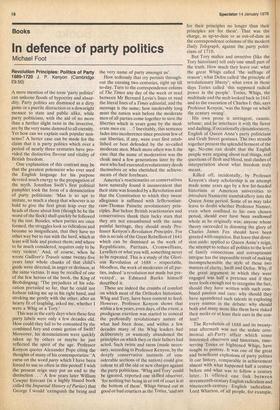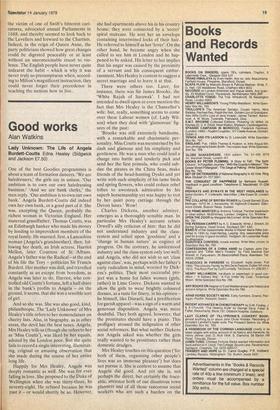Books
In defence of party politics
Michael Foot
Revolution Principles: Politics of Party 1689-1720 J. P. Kenyon (Cambridge e9.50) A mere mention of the term 'party politics' can unloose floods of hypocrisy and absur dity. Party politics are dismissed as a dirty game or a puerile distraction or a downright menace to state and public alike, while party politicians, with the aid of no more than a further slight twist in the invective, are by the very name damned to all eternity.
Yet how can we explain such popular nonsense? A better case can be made for the claim that it is party politics which over a period of nearly three centuries have provided the distinctive flavour and vitality of British freedom.
One explanation of this contrast may be that the greatest polemicist who ever used the English language for his purpose devoted much energy to the propagation of the myth. Jonathan Swift's first political pamphlet took the form of a denunciation of party politicians: 'Man is so apt to imitate, so much a sheep that whoever is so bold to give the first great leap over the heads of those about him (though he be the worst of the flock) shall quickly be followed by the rest. Besides, when parties are once formed, the struggles look so ridiculous and become so insignificant, that they have no other way but to run with the herd, which at least will hide and protect them; and where to be much considered, requires only to be very violent.' And, of course, when he wrote Gulliver's Travels some twenty-five years later whole chunks of that child's guide were directed, in anger or derision, at the same victims. It may be recalled of one of the few heroes of the book, the King of Brobdingnag: 'The prejudices of his education prevailed so far, that he could not forbear taking me up in his right hand, and stroking me gentlywith the other, after an hearty fit of laughing, asked me, whether I were a Whig or a Tory.'
This was in the early days when these first party labels were only a few decades old. How could they fail to be consumed by the combined fury and comic genius of Swift? Moreover, his denunciations were quickly taken up by others or maybe he just reflected the spirit of the age. Professor Kenyon quotes Alexander Pope citing the thoughts of many of his contemporaries: 'A curse on the word party which I have been forced to use so often in this period! I wish the present reign may put an end to the distinction . . .' A few years later William Cowper forecast (in a highly biased book called the Impartial History of Parties) that George I would 'extinguish the being and the very name of party amongst us'.
How tediously that cry persists through out the ensuing two centuries, right up till to-day. Turn to the correspondence colums of The Times any day of the week or read between Mr Bernard Levin's lines or read the literal lines of a Times editorial, and the message is the same; how intolerably long must the nation wait before the moderate men of all parties come together to save the liberties which in years gone by the mod erate men etc. . .? Inevitably, this sentence fades into incoherence since precious few of our liberties, if any, were ever first estab lished or best defended by the so-called moderate men. Much more often was it the case that the name of moderation was the cloak used a few generations later by the men who had executed revolutionary deeds themselves or who cherished the achievements of their forebears.
America's reactionaries or conservatives have naturally found it inconvenient that their state was founded by a Revolution and that the Constitution to which they swear allegiance is suffused with Jeffersonian cum-Thomas Paineite revolutionary prin ciples. But before British reactionaries and conservatives thank their lucky stars that they are not encumbered with the same painful heritage, they should study Professor Kenyon's Revolution Principles. For this is no tale of the Great Rebellion of 1641 which can be dismissed as the work of Republicans, Puritans, Cromwellians, Levellers or what you will, something never to be repeated. This is a study of the Glorious Revolution of 1688 — respectable, bloodless, the work of moderates of all parties, indeed 'a revolution not made but prevented', as Edmund Burke himself described it.
These are indeed the crumbs of comfort on which most of the Orthodox historians, Whig and Tory, have been content to feed.
However, Professor Kenyon shows that within a few years, even days, of the event, a prodigious exertion was started to conceal the profoundly revolutionary nature of what had been done, and within a few decades many of the Whig leaders had deliberately or wantonly abandoned the principles on which they or their fathers had acted. Such twists and turns (made neces sary, according to Professor Kenyon, by the deeply conservative instincts of con siderable sections of the nation) could give colour to all the old or new charges against the party politicians. 'Whig and Tory' could be ignored, reported one skilled observer, 'for nothing but being in or out of court is at the bottom of them'. Whigs turned out as good or bad courtiers as the Tories, 'and are for their principles no longer than their principles are for them'. That was the charge, as up-to-date or as out-of-date as the correspondence columns of the modern Daily Telegraph, against the party politicians of 1710.
But Tory malice and invective (like the Tory historians) tell only one small part of the truth. How much they leave out: what the great Whigs called 'the suffrage of reason'; what Defoe called 'the principle of revolutionary liberty'; what even in those days Tories called 'this supposed radical power in the people'. Tories, Whigs, the multitude and the mob looked back to 1641 and to the execution of Charles I: this, says Professor Kenyon, 'was the hinge on which the century swung'.
His own prose is astringent, caustic, urbane; and he interlaces it with the fierce and dashing, if occasionally circumlocutory, English of Queen Anne's party politicians and Grub Street geniuses. The two strands together present the splendid ferment of the age. No-one can doubt that the English people were arguing about real things, real questions of flesh and blood, real clashes of interpretation about what freedom truly meant.
Killed off, incidentally, by Professor Kenyon's sharp scholarship is an attempt made some years ago by a few fat-headed historians at American universities to introduce Namierite numbskullery into the Queen Anne period. Some of us may take leave to doubt whether Professor Namier, even when confined to his own chosen period, should ever have been swallowed whole as he originally was; anyone whose theory succeeded in dimming the glory of Charles James Fox should have been greeted with suspicion. But leave that diversion aside: applied to Queen Anne's reign, the attempt to reduce all politics to the level of family connections and corruptionist intrigue has the impossible result of making incomprehensible the style of those two masters of clarity, Swift and Defoe. Why, if the great argument in which they were engaged was half a pretence and if they were fools enough not to recognise the fact, should they have written with such combined passion and care: why should they have squandered such talents in exploring every nuance in the debate: why should both and many more like them have risked their necks or at least their ears in the contest?
The Revolution of 1688 and its twentyyear aftermath was not the sedate ceremonial all-Party affair which some interested observers and historians, timeserving Tories or frightened Whigs, have sought to portray. It was one of the great and beneficent explosions of party politics in our history, comparable in achievement almost with what happened half a century before and what was to follow a century later. It offered one link between seventeenth-century English radicalism and nineteenth-century English radicalism. Lord Wharton, of all people, for example, the victim of one of Swift's bitterest caricatures, advocated annual Parliaments in 1688, and thereby seemed to look back to the 'Levellers and forward to the Chartists. Indeed, in the reign of .Queen Anne, the party politicians showed how great changes could be digested peaceably or at least without an unconscionable resort to violence. The English people have never quite unlearnt the habit — which is why it was never truly so presumptuous when, according to Milton's magnificent instruction, they could never forget their precedence in teaching the nations how to live.































 Previous page
Previous page